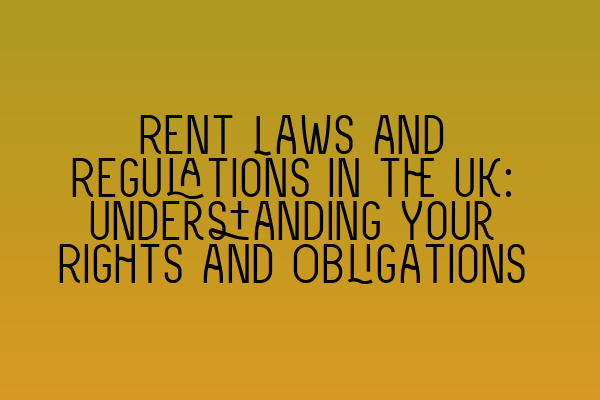Rent Laws and Regulations in the UK: Understanding Your Rights and Obligations
As a tenant or a landlord in the UK, it is crucial to have a clear understanding of the rent laws and regulations that govern the landlord-tenant relationship. These laws outline the rights and obligations of both parties, ensuring a fair and just arrangement for all involved.
In this comprehensive guide, SQE Property Law & Land Law will delve into the key aspects of rent laws and regulations in the UK, providing you with valuable insights to help you navigate the rental market successfully.
1. Understanding Your Tenancy Agreement
Before delving into the specifics of rent laws, it is important to familiarize yourself with the tenancy agreement. This legally binding contract outlines the terms and conditions of the tenancy, including the rent amount, payment schedule, and duration of the tenancy.
Misunderstanding or misrepresentation in contracts can lead to legal disputes. Accurate representation of the terms and conditions is vital. For a detailed understanding, you should read our related article: Misrepresentation in Contracts: Unveiling Deceptive Practices.
2. Rent Increases and Rent Caps
In the UK, landlords have the right to increase the rent, but this must be done in accordance with the law. Rent increases are usually specified in the tenancy agreement or regulated by local rent control laws. It is crucial to understand your rights and obligations regarding rent increases to avoid any disputes with your landlord.
In certain areas, local authorities may impose rent caps to ensure affordable housing for tenants. These caps limit the maximum rent that can be charged for certain types of properties. Understanding rent caps in your area is essential for both landlords and tenants.
If you want to gain a deeper understanding of rent laws and regulations, take a look at our related article: A Closer Look at SQE Contract Law Syllabus.
3. Security Deposits
Security deposits are a common practice in the rental market. Landlords require tenants to pay a deposit upfront as a form of security against potential damage to the property or unpaid rent. The amount of the deposit is usually specified in the tenancy agreement.
As a tenant, it is important to understand your rights regarding the security deposit. Your landlord must protect your deposit in a government-approved tenancy deposit scheme. This protects your money and ensures its return at the end of the tenancy, minus any legitimate deductions.
4. Repairs and Maintenance
Both tenants and landlords have obligations when it comes to repairs and maintenance of the rental property. The landlord is responsible for maintaining the structure and exterior of the property, while tenants are responsible for keeping the property clean and notifying the landlord of any necessary repairs.
Understanding your rights and obligations regarding repairs and maintenance is crucial for a harmonious landlord-tenant relationship. It is essential to address any repair issues promptly to prevent further damage and ensure a safe living environment.
For a deeper insight into how landmark cases and influential judicial decisions have shaped rent laws in the UK, don’t miss our related article: SQE Contract Law: Analyzing Landmark Cases and Influential Judicial Decisions.
5. Ending a Tenancy
Whether you are a tenant or a landlord, understanding the process of ending a tenancy is vital. Different types of tenancies have different rules and notice periods. It is crucial to comply with these rules to avoid legal complications and potential disputes.
If you are a tenant looking to end your tenancy, be sure to provide written notice to your landlord as specified in your tenancy agreement. Conversely, landlords must provide tenants with appropriate notice and follow the correct procedures to legally terminate a tenancy.
6. Dispute Resolution
Disputes between landlords and tenants can arise for various reasons, such as rent arrears, property damage, or disagreements over repairs. When disputes occur, it is important to try and resolve them amicably before resorting to legal action.
Understanding the dispute resolution process is crucial for both tenants and landlords. In some cases, mediation or arbitration may be required to find a fair and mutually acceptable solution. If a resolution cannot be reached, legal action may be necessary.
For a detailed guide on key considerations and best practices in contract law for services, be sure to check out our related article: Contract Law for Services: Key Considerations and Best Practices.
Conclusion
Rent laws and regulations in the UK provide a framework for a fair and balanced landlord-tenant relationship. Understanding your rights and obligations as either a tenant or a landlord is essential for a smooth and successful tenancy.
By familiarizing yourself with the tenancy agreement, rent increases and caps, security deposits, repairs and maintenance, the process of ending a tenancy, and dispute resolution, you can confidently navigate the rental market and mitigate potential legal issues.
For further insights into the legal aspects of contracts and capacity, read our related article: Understanding Contractual Capacity: Rights and Limitations.
Remember, staying informed and seeking professional legal advice when necessary is crucial to protect your rights and interests in the complex field of rent laws and regulations in the UK.
